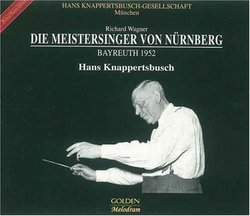| All Artists: Ira Malaniuk, Karl Mikorey, Gustav Neidlinger, Heinrich Pfanzel, Walter Stoll, Gerhard Stolze, Karl Terkal, Gerhard Unger Title: Wagner: Die Meistersinger von Nurnberg - Bayreuth 1952 / Knappertsbusch Members Wishing: 0 Total Copies: 0 Label: Melodram Release Date: 8/19/1997 Genre: Classical Style: Opera & Classical Vocal Number of Discs: 4 SwapaCD Credits: 4 UPC: 608974100322 |
Search - Ira Malaniuk, Karl Mikorey, Gustav Neidlinger :: Wagner: Die Meistersinger von Nurnberg - Bayreuth 1952 / Knappertsbusch
 | Ira Malaniuk, Karl Mikorey, Gustav Neidlinger Wagner: Die Meistersinger von Nurnberg - Bayreuth 1952 / Knappertsbusch Genre: Classical
|
Larger Image |
CD Details |
CD ReviewsFamous 1952 Knappertsbusch "Meistersinger" from Bayreuth L. E. Cantrell | Vancouver, British Columbia Canada | 02/05/2007 (5 out of 5 stars) "SOURCE: Live recording of the July 30, 1952 performance at the Bayreuth Festival.
SOUND: Good 1950s mono that catches the voices very well and the orchestra somewhat less so, but still acceptably for anyone but an audio purist. In a historic document such as this one, the quality of performance is always more to be considered than the mere mechanical reproduction of sound. CAST: Hans Sachs*,cobbler - Otto Edelmann; Walther von Stolzing, knight - Hans Hopf; Eva Pogner - Lisa della Casa; Sixtus Beckmesser*, town clerk - Heinrich Pflanzl; Veit Pogner*, goldsmith - Kurt Boehme; David, apprentice cobbler - Gerhard Unger; Magdalena, Eva's nurse - Ira Malaniuk; Fritz Kothner*, baker - Werner Faulhaber; Kunz Vogelgesang*, furrier - Karl Terkal; Konrad Nachtigall*, tinsmith - Walter Stoll; Balthasar Zorn*, pewterer - Josef Janko; Ulrich Eisslinger*, grocer - Karl Mikorey; Augustin Moser*, tailor - Gerhard Stolze; Herrmann Ortel*, soap maker - Theo Adam; Hans Schwarz, stocking weaver - Heinz Borst; Hans Foltz*, coppersmith - Max Kohl; Nightwatchman - Gustav Neidlinger. (* Member of the Guild of Master Singers) CONDUCTOR: Hans Knappertsbusch with the Bayreuth Festival Orchestra and Chorus. COMMENTARY: In 1952, the Bayreuth Festival was at the beginning of its rebirth after the--ahem--recent unpleasantness. Winifred Wagner, Richard Wagner's English-born daughter-in-law was still very much alive but firmly removed from authority at the Festival because of her loudly proclaimed political affiliations. Her sons Wieland and Wolfgang were in charge of the de-Nazified Festival and its nearly empty treasury. It is a famous part of opera lore that the bothers coped with both problems by presenting semi-abstract productions with next-to-bare stages, few props, simple (not to mention cheap) costumes and elaborate lighting. All that was certainly true of that year's "Tristan und Isolde," produced by Wieland Wagner. But if Wolfgang's 1951 "Meistersinger" was still a newish production in this its second year, it was certainly a traditional one. Production photos show St. Katherine's Church in the first act to have been massive and almost oppressively heavy. Hans Sach's shop in the second act was on one side of a grimly authentic-looking Sixteenth Century cityscape. The interior of his house in the first part of act three was dimly-lit and gloomily realistic. Only the final set gave a hint of things to come, for Nuremberg was reduced to a bare stage with risers on each side and what appear to be cut-outs of the skyline placed flat against a sky scrim. Costumes and props were resolutely realistic and clunky throughout. All that would change in the next "Meistersinger" production when Wieland got his hands on it ... but not yet. Less articulated in opera lore is the fact that the new production style was not terribly signifcant then and much less so now. What was important was that the post-war period was a time of immensely skilled older conductors (along with that young whippersnapper Karajan) and brilliantly talented singers. Just look at the cast list above: Edelmann, della Casa, Boehme, Unger, Malaniuk, Stolze, and yes, even Hopf are names to conjure with. And way down at the bottom of the cast list, two brilliant newcomers Theo Adam and Gustav Neidlinger. In the following year, Hans Knapperstbusch would famously demand that the Wagner brothers restore what their grandfather had put into his operas. They would not or could not, so the great old traditionalist departed Bayreuth. That crisis was yet to come. In 1952 Knappertsbusch must have been happy with a realistic production and a cast that was literally of festival quality. This is a famous performance from a famous production. It is a record of a specific night. There are occasional rough spots, as is to be expected in a live performance. The overall performance is excellent, even Hopf is bearable. (He had the voice and the strength to be great but not, apparently, the understanding or the will--a great pity.) Good performance, great conductor, stellar cast, it's not perfect, for no "Meistersinger" recording is, but it is certainly worth five stars." |

 Track Listings (10) - Disc #1
Track Listings (10) - Disc #1